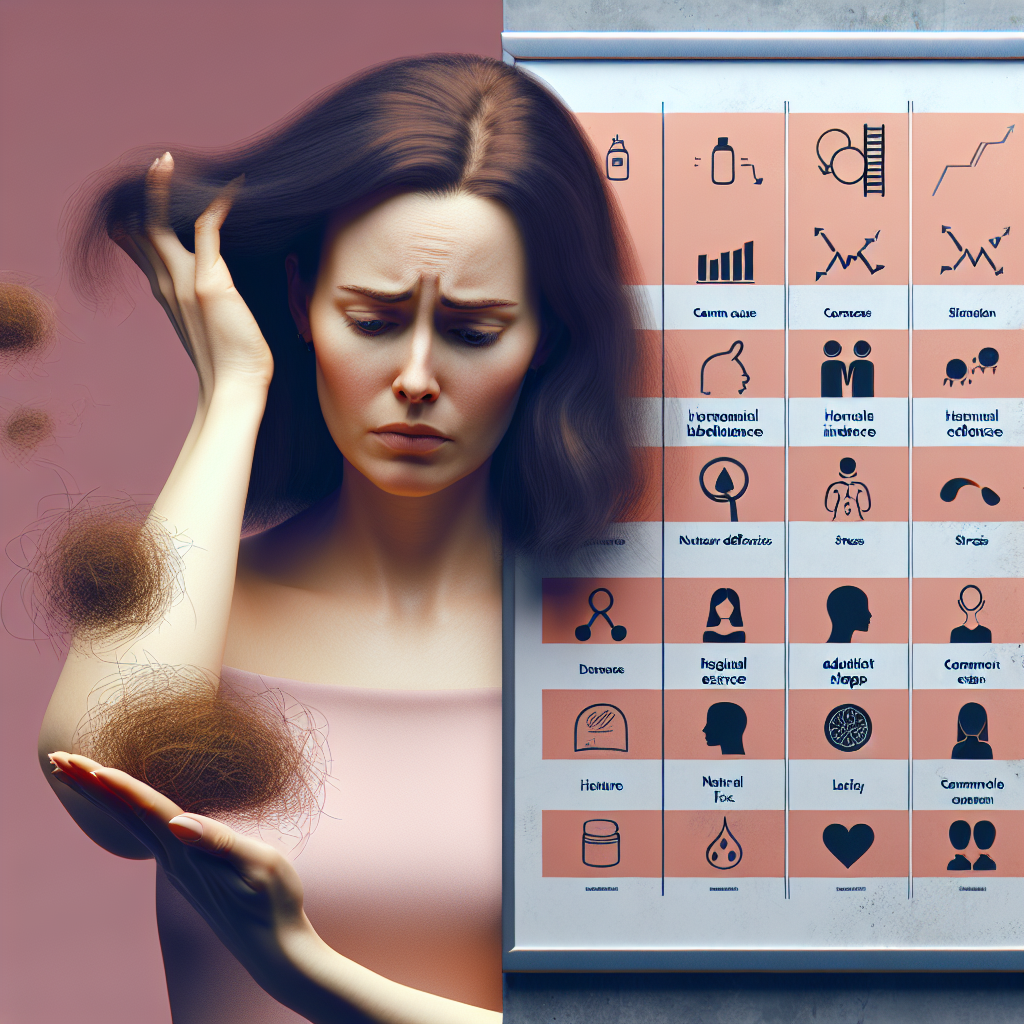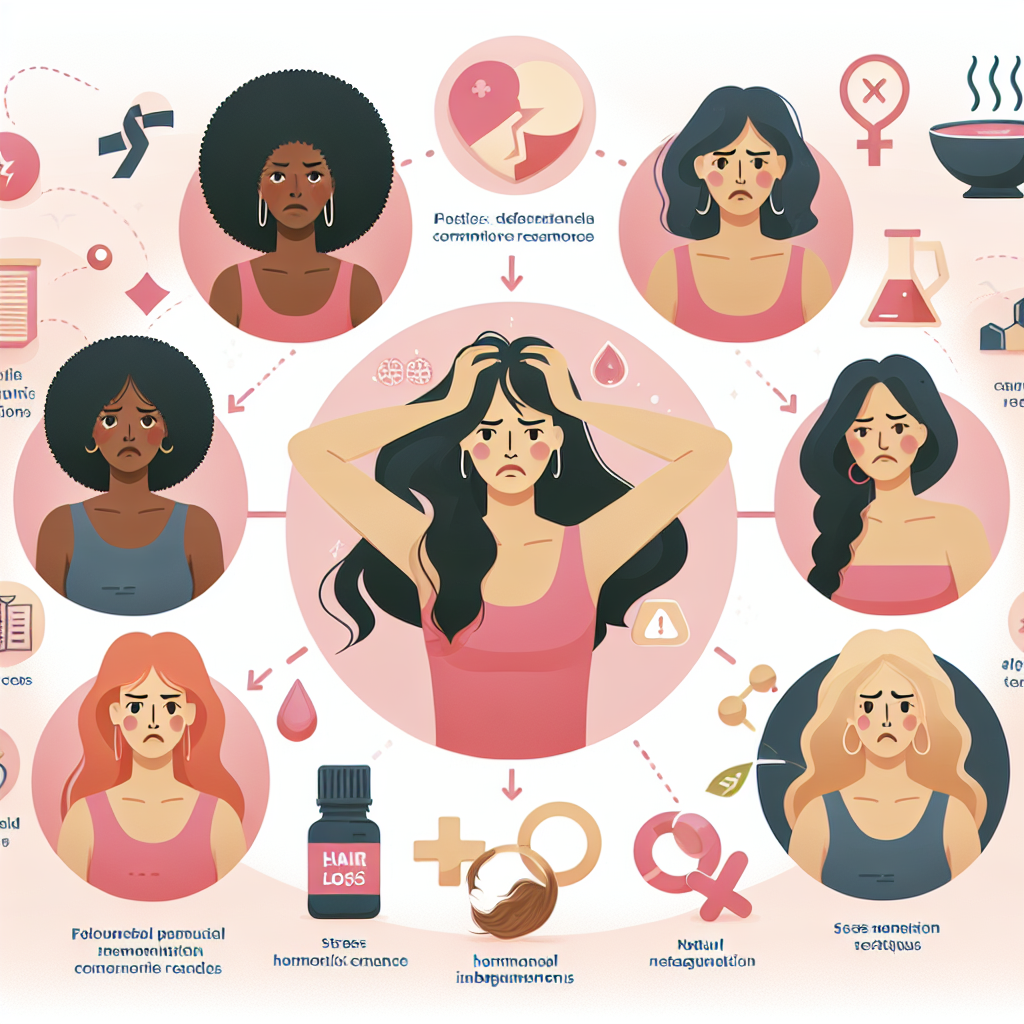Hair Loss in Women: Common Causes and Natural Fixes

Discover the common causes of hair loss in women and explore natural fixes today. Don’t let hair loss control your life. Empower yourself with knowledge and take the first step towards healthier, fuller hair. Visit My Vibrant Vitality now.
Understanding the Common Causes of Hair Loss in Women
Hair loss in women is a common yet often overlooked issue. It is a condition that can significantly impact a woman’s self-esteem and overall quality of life. Understanding the common causes of hair loss in women is the first step towards finding a solution.
One of the most common causes of hair loss in women is hormonal imbalance. Hormones play a crucial role in regulating the hair growth cycle. Changes in hormonal levels, particularly during menopause, pregnancy, or due to conditions such as polycystic ovary syndrome (PCOS), can disrupt this cycle, leading to hair thinning or loss.
Another common cause is stress. High levels of stress can push hair follicles into a resting phase, halting hair growth. This condition, known as telogen effluvium, can result in noticeable hair loss several months after a stressful event.
Nutritional deficiencies can also contribute to hair loss. Essential nutrients like iron, vitamin D, and protein are vital for hair growth. A lack of these nutrients can lead to hair thinning or loss.
Lastly, certain medical conditions and treatments can cause hair loss. Conditions such as thyroid disease, alopecia areata, and scalp infections can lead to hair loss. Similarly, treatments like chemotherapy can cause temporary or permanent hair loss.
Now that we have a better understanding of the common causes of hair loss in women, let’s explore some natural fixes.
One of the most effective natural remedies for hair loss is a balanced diet. Consuming a diet rich in protein, iron, and vitamin D can help promote hair growth. Foods like eggs, spinach, and fatty fish are excellent sources of these nutrients.
Regular exercise is another natural fix. Exercise helps reduce stress levels, which can in turn help regulate the hair growth cycle. Activities like yoga, meditation, and deep-breathing exercises can be particularly beneficial in managing stress.
Scalp massages can also help stimulate hair growth. Massaging the scalp increases blood flow to the hair follicles, promoting hair growth. Using essential oils like rosemary or peppermint oil during the massage can further enhance this effect.
Another natural remedy is the use of herbal supplements. Supplements like saw palmetto and ginseng have been shown to promote hair growth. However, it’s important to consult with a healthcare provider before starting any new supplement regimen.
Lastly, maintaining good hair care practices can help prevent hair loss. Avoiding harsh hair treatments, using a gentle shampoo, and avoiding tight hairstyles can help protect the hair and promote growth.
In conclusion, while hair loss in women can be distressing, understanding its common causes can help in finding effective solutions. Natural fixes like a balanced diet, regular exercise, scalp massages, herbal supplements, and good hair care practices can help promote hair growth and prevent further hair loss. However, it’s important to consult with a healthcare provider to determine the underlying cause of hair loss and the most appropriate treatment.
Natural Fixes for Hair Loss in Women: A Comprehensive Guide

Hair loss in women is a common issue that can be caused by a variety of factors, including hormonal changes, stress, poor nutrition, and certain medical conditions. While it can be distressing, there are several natural fixes that can help to combat this problem and promote healthy hair growth.
Firstly, it’s important to understand that hair loss is often a symptom of an underlying issue. Therefore, addressing the root cause is crucial. For instance, if stress is the culprit, incorporating stress management techniques such as yoga, meditation, or deep breathing exercises into your daily routine can be beneficial. Similarly, if poor nutrition is to blame, improving your diet to include more protein, vitamins, and minerals can help to nourish your hair from within.
One of the most effective natural fixes for hair loss is the use of essential oils. Lavender, rosemary, and peppermint oils have been shown to stimulate hair growth when massaged into the scalp regularly. These oils increase blood circulation to the scalp, which can help to strengthen the hair follicles and promote growth. However, it’s important to dilute these oils with a carrier oil, such as coconut or jojoba oil, before applying them to the scalp to avoid irritation.
Another natural remedy for hair loss is the use of aloe vera. This plant has been used for centuries for its healing properties and is known to soothe and cleanse the scalp, creating a healthy environment for hair to grow. Applying aloe vera gel directly to the scalp and leaving it on for a few hours before rinsing it off can help to reduce hair loss.
In addition to these topical treatments, certain dietary changes can also help to combat hair loss. A diet rich in protein, iron, zinc, and vitamin E can help to promote healthy hair growth. Foods such as eggs, spinach, lentils, and almonds are all excellent sources of these nutrients. Additionally, staying hydrated by drinking plenty of water can also help to keep your hair healthy and prevent it from becoming dry and brittle, which can lead to breakage and hair loss.
Lastly, it’s important to avoid harsh hair care practices that can damage your hair and lead to hair loss. This includes avoiding tight hairstyles that pull on the hair, minimizing the use of heat styling tools, and avoiding harsh chemical treatments. Instead, opt for gentle, natural hair care products and try to let your hair air dry whenever possible.
In conclusion, while hair loss in women can be distressing, there are several natural fixes that can help to combat this issue. By addressing the root cause of the hair loss, using natural topical treatments, making dietary changes, and adopting gentle hair care practices, it’s possible to promote healthy hair growth and reduce hair loss. However, it’s important to remember that these remedies may take time to show results, and it’s always a good idea to consult with a healthcare professional if you’re experiencing significant hair loss.
Exploring the Connection between Hormonal Imbalance and Hair Loss in Women
Hair loss in women is a common yet distressing issue that can significantly impact self-esteem and confidence. While it’s normal to shed some hair each day, excessive hair loss or thinning can be a sign of underlying health issues. One of the most common causes of hair loss in women is hormonal imbalance, a condition that can be triggered by various factors such as age, stress, diet, and certain medical conditions.
Hormones play a crucial role in regulating the growth cycle of hair follicles. When these hormones are out of balance, it can disrupt the hair growth cycle, leading to hair loss. For instance, an excess of androgens, male hormones that are also present in women, can cause hair follicles to shrink, resulting in thinning hair or baldness. Similarly, changes in estrogen and progesterone levels during menopause can also lead to hair loss, as these hormones help to keep hair in the growing phase.
Stress is another factor that can cause hormonal imbalance and subsequent hair loss. When we are stressed, our bodies produce more cortisol, a hormone that can disrupt the hair growth cycle. Additionally, stress can trigger scalp problems such as dandruff, disrupt eating habits and nutrient absorption, and lead to a condition called telogen effluvium, where hair follicles are pushed into the resting phase, leading to excessive shedding.
Polycystic ovary syndrome (PCOS), a common condition characterized by hormonal imbalance, can also lead to hair loss in women. Women with PCOS have higher levels of androgens, which can lead to hair thinning on the scalp. On the other hand, thyroid disorders, both hyperthyroidism and hypothyroidism, can also cause hair loss, as the thyroid hormones directly affect the hair growth cycle.
While hormonal imbalance can be a daunting cause of hair loss, there are natural fixes that can help restore balance and promote hair growth. A balanced diet rich in protein, vitamins, and minerals can help nourish hair follicles and support hair growth. Foods rich in omega-3 fatty acids, vitamin D, B-vitamins, iron, and zinc are particularly beneficial for hair health.
Regular exercise can also help balance hormones by reducing stress levels and improving overall health. Yoga and meditation, in particular, can be effective in reducing stress and balancing hormones. Additionally, getting enough sleep is crucial for hormone regulation and can help prevent hair loss.
Natural remedies such as scalp massages and essential oils can also help stimulate hair growth. Massaging the scalp can increase blood flow to the hair follicles, promoting growth. Essential oils like lavender, rosemary, and peppermint have been shown to stimulate hair growth when applied to the scalp.
In conclusion, while hormonal imbalance is a common cause of hair loss in women, it is not an insurmountable problem. By understanding the connection between hormones and hair loss, women can take proactive steps to balance their hormones and promote healthy hair growth. Whether through diet, exercise, stress management, or natural remedies, there are many ways to combat hair loss and regain confidence. However, it’s important to consult with a healthcare provider before starting any new treatment, as hair loss can sometimes be a sign of more serious health issues.